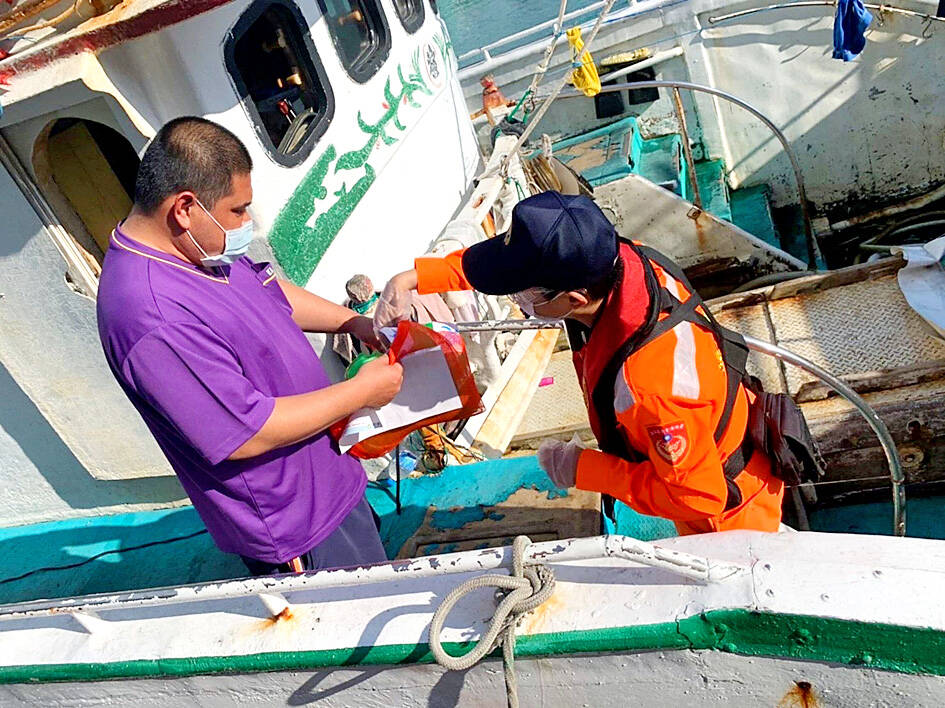Pingtung County fishers have collected more than 57 tonnes of marine debris under a reward program introduced by the local government in 2022 to mitigate the impact of ocean waste on marine life and marine ecosystems.
Under the program, Pingtung fishing boats have brought in 57.9 tonnes of trash they found while operating in the open sea to 23 security inspection centers at their home ports across the county in exchange for home-grown agricultural or eco-friendly products, the Pingtung County Environmental Protection Bureau said on Thursday.
Last year, a reward points system was launched, allowing fishers to exchange the waste they collect from the sea for household appliances, which provides a further boost to the program aiming to reduce marine debris at the source, the bureau said.

Photo courtesy of the Pingtung County Government
Protecting marine ecosystems is a critical and urgent task, with surveys showing 8 million tonnes of plastic, the main component of marine debris, enter the ocean globally per year, the Pingtung County Government said.
Plastic particles in the ocean eaten by fish are eventually consumed by people through the food chain, and as such represent a major threat to the environment and ecosystems, it said.
A fishing boat skipper surnamed Chiang (江) said that due to the reward program, he is now more motivated to look for marine debris.
“Though a small action, it will change the whole picture as long as everyone becomes part of the program,” he said.
To encourage foreign fishers to also join in the initiative, the bureau has printed booklets explaining how it works in six languages — English, Indonesian, Thai, Malay, Filipino and Vietnamese.

Taiwan is to commence mass production of the Tien Kung (天弓, “Sky Bow”) III, IV and V missiles by the second quarter of this year if the legislature approves the government’s NT$1.25 trillion (US$39.78 billion) special defense budget, an official said yesterday. Commenting on condition of anonymity, a defense official with knowledge of the matter said that the advanced systems are expected to provide crucial capabilities against ballistic and cruise missiles for the proposed “T-Dome,” an advanced, multi-layered air defense network. The Tien Kung III is an air defense missile with a maximum interception altitude of 35km. The Tien Kung IV and V

The disruption of 941 flights in and out of Taiwan due to China’s large-scale military exercises was no accident, but rather the result of a “quasi-blockade” used to simulate creating the air and sea routes needed for an amphibious landing, a military expert said. The disruptions occurred on Tuesday and lasted about 10 hours as China conducted live-fire drills in the Taiwan Strait. The Civil Aviation Administration (CAA) said the exercises affected 857 international flights and 84 domestic flights, affecting more than 100,000 travelers. Su Tzu-yun (蘇紫雲), a research fellow at the government-sponsored Institute for National Defense and Security Research, said the air

Trips for more than 100,000 international and domestic air travelers could be disrupted as China launches a military exercise around Taiwan today, Taiwan’s Civil Aviation Administration (CAA) said yesterday. The exercise could affect nearly 900 flights scheduled to enter the Taipei Flight Information Region (FIR) during the exercise window, it added. A notice issued by the Chinese Civil Aviation Administration showed there would be seven temporary zones around the Taiwan Strait which would be used for live-fire exercises, lasting from 8am to 6pm today. All aircraft are prohibited from entering during exercise, it says. Taipei FIR has 14 international air routes and

Taiwan lacks effective and cost-efficient armaments to intercept rockets, making the planned “T-Dome” interception system necessary, two experts said on Tuesday. The concerns were raised after China’s military fired two waves of rockets during live-fire drills around Taiwan on Tuesday, part of two-day exercises code-named “Justice Mission 2025.” The first wave involved 17 rockets launched at 9am from Pingtan in China’s Fujian Province, according to Lieutenant General Hsieh Jih-sheng (謝日升) of the Office of the Deputy Chief of the General Staff for Intelligence at the Ministry of National Defense. Those rockets landed 70 nautical miles (129.6km) northeast of Keelung without flying over Taiwan,